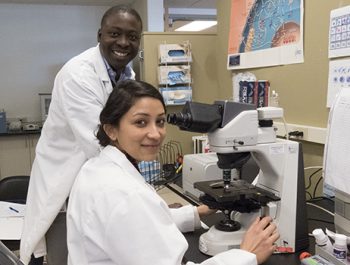
Growing up in Ghana, a sub-Saharan country on the west coast of Africa, Dr. Nana Minkah, a scientist at the Kappe Lab, endured the unenviable “rite of passage” contracting malaria multiple times as a child.
While he doesn’t remember the early years when the associated high fever caused hallucinations, he has distinct memories of later bouts when he was bedridden for more than a week with pain and chills so bad his body visibly shivered.
The multiple malaria infections Minkah endured in his youth is common to those living in sub-Saharan Africa where the mosquito-transmitted parasitic infection is one of the deadliest diseases in human history. Despite tremendous attempts to rid the world of the malaria pathogens, it continues to sicken hundreds of millions and kills nearly half a million people each year. Malaria’s biggest toll is on children and pregnant women in developing countries.
That’s why, after Minkah completed his Ph.D. in Molecular Genetics and Microbiology, he joined the Kappe Lab in 2015. Although he had no experience in parasitology, he wanted to work on malaria — a disease that continues to plague his homeland.
“I wanted to do work that has clinical implications with the potential to save the lives of people who look like me,” Minkah explained.
Dr. Stefan Kappe, associate director at the Center for Global Infectious Disease Research and leader of the Kappe Lab, values Minkah’s intimate knowledge of malaria’s impact.
“Individuals who have personal experience with malaria understand what a terrible disease and vast global health problem it truly is,” he said. “They understand very clearly how important it is to develop a much-needed vaccine and discover new drugs since drug resistance in the parasite makes old drugs ineffective.”
A fresh approach
Researchers across the globe have tried to solve the malaria problem since the 19th century, with much success eradicating it in the U.S. However, endemic infections persist, especially in resource-poor areas of the world. To make real headway with disease prevention, there needs to be a new approach.
One of the ways the Kappe Lab hopes to pioneer new ways to prevent malaria is with genetically engineered, attenuated whole parasites (GAP) vaccines. A vaccine with a first-generation strain of the most lethal malaria parasite Plasmodium falciparum, called GAP3KO malaria vaccine candidate, has successfully completed the first safety phase of clinical trials and is continuing clinical development. The Kappe Lab is also conducting research to further improve GAPs with the next-generation GAP already in the pipeline.
GAP3K0 Malaria Vaccine from Seattle Children’s on Vimeo.
All vaccines rely on one simple principle: give the immune system an advantage over the pathogen by teaching it to recognize the pathogen before an actual infection occurs. The immune system then forms a “memory” of the pathogen and can build defenses capable of eliminating it and its associated disease during a real infection.
What makes the Kappe Lab vaccine different from other malaria vaccines is the creation of GAP strains that arrest and die in the liver before they can progress to the dangerous blood stage infection. Kappe calls this the “they can check in, but they can’t check out” approach. The arrest of these GAPs in the liver exposes them to the immune system and engenders a powerful and effective immune response that can block a new malaria infection from the moment a person receives an infectious mosquito bite.
The lab has found that this immune response can attack the parasite during the initial phase of infection. This not only prevents disease in the exposed individual, but it also stops the mosquito-human-mosquito transmission cycle and could greatly accelerate the eradication of malaria.
“What we are trying to do is a tall order,” said Minkah. “We are trying to develop a product that will create unnatural immunity.”
Drawing on diverse perspectives
The team’s vaccine discovery efforts are also shaped by other scientists in the center who bring expertise in biology, clinical research, chemical engineering, field biology, molecular biology, medical parasitology, immunology, mass spectrometry and genetics. Over 50 researchers in seven labs at the research institute are working on different aspects of malaria infection.
Kappe believes that this type of collaborative, cross-fertilization approach between biology, immunology and vaccine design surfaces fresh, creative ideas.
“Let’s not forget that people have tried for more than 100 years to make a successful malaria vaccine,” he said. “New approaches are needed.”
For Minkah, he’s thankful he has built up immunity to malaria and no longer lives with the ever-present threat of infection. There is, however, a strong awareness of the devastating impacts of the disease.
“My experience with malaria doesn’t impact my day-to-day life, but it’s definitely in the background,” Minkah said. “There’s no guarantee that a highly effective vaccine will be deployed within my time here, but I hope the discoveries I make will help contribute to a breakthrough.”

